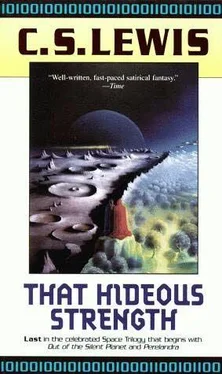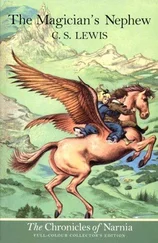Clive Lewis - That Hideous Strength
Здесь есть возможность читать онлайн «Clive Lewis - That Hideous Strength» — ознакомительный отрывок электронной книги совершенно бесплатно, а после прочтения отрывка купить полную версию. В некоторых случаях можно слушать аудио, скачать через торрент в формате fb2 и присутствует краткое содержание. Жанр: Религиоведение, Фэнтези, на английском языке. Описание произведения, (предисловие) а так же отзывы посетителей доступны на портале библиотеки ЛибКат.
- Название:That Hideous Strength
- Автор:
- Жанр:
- Год:неизвестен
- ISBN:нет данных
- Рейтинг книги:5 / 5. Голосов: 1
-
Избранное:Добавить в избранное
- Отзывы:
-
Ваша оценка:
- 100
- 1
- 2
- 3
- 4
- 5
That Hideous Strength: краткое содержание, описание и аннотация
Предлагаем к чтению аннотацию, описание, краткое содержание или предисловие (зависит от того, что написал сам автор книги «That Hideous Strength»). Если вы не нашли необходимую информацию о книге — напишите в комментариях, мы постараемся отыскать её.
That Hideous Strength — читать онлайн ознакомительный отрывок
Ниже представлен текст книги, разбитый по страницам. Система сохранения места последней прочитанной страницы, позволяет с удобством читать онлайн бесплатно книгу «That Hideous Strength», без необходимости каждый раз заново искать на чём Вы остановились. Поставьте закладку, и сможете в любой момент перейти на страницу, на которой закончили чтение.
Интервал:
Закладка:
“You are thinking about what is right?” said the Director. Jane started, and flushed. She had not, she realised, been thinking about that.
“Of course,” said the Director, “things might come to such a point that you would be justified in coming here, even wholly against his will, even secretly. It depends on how close the danger is-the danger to us all, and to you personally.”
“I thought the danger was right on top of us now, from the way Mrs. Denniston talked.”
“That is just the question,” said the Director, with a smile. “I am not allowed to be too prudent. I am not allowed to use desperate remedies until desperate diseases are really apparent. Otherwise we become just like our enemies-breaking all the rules whenever we imagine that it might possibly do some vague good to humanity in the remote future.”
“But will it do anyone any harm if I come here?” asked Jane.
He did not directly answer this. Presently he spoke again.
“It looks as if you will have to go back; at least for the present. You will, no doubt, be seeing your husband again fairly soon. I think you must make at least one effort to detach him from the N.I.C.E.”
“But how can I, sir?” said Jane. “What have I to say to him. He’d think it all nonsense. He wouldn’t believe all that about an attack on the human race.” As soon as she had said it she wondered, “Did that sound cunning?” then, more disconcertingly, “Was it cunning?”
“No,” said the Director. “And you must not tell him. You must not mention me nor the company at all. We have put our lives in your hands. You must simply ask him to leave Belbury. You must put it on your own wishes. You are his wife.”
“Mark never takes any notice of what I say,” answered Jane. She and Mark each thought that of the other.
“Perhaps,” said the Director, “you have never asked anything as you will be able to ask this. Do you not want to save him as well as yourself?”
Jane ignored this question. Now that the threat of expulsion from the house was imminent, she felt a kind of desperation. Heedless of that inner commentator who had more than once during this conversation shown her her own words and wishes in such a novel light, she began speaking rapidly.
“Don’t send me back,” she said. “I am all alone at home, with terrible dreams. It isn’t as if Mark and I saw much of one another at the best of times. I am so unhappy. He won’t care whether I come here or not. He’d only laugh at it all if he knew. Is it fair that my whole life should be spoiled just because he’s got mixed up with some horrible people? You don’t think a woman is to have no life of her own just because she’s married?”
“Are you unhappy now?” said the Director. A dozen affirmatives died on Jane’s lips as she looked up in answer to his question. Then suddenly, in a kind of deep calm, like the stillness at the centre of a whirlpool, she saw the truth, and ceased at last to think how her words might make him think of her, and answered, “No.”
“But,” she added after a short pause, “it will be worse now, if I go back.”
“Will it?”
“I don’t know. No. I suppose not.” And for a little time Jane was hardly conscious of anything but peace and well-being, the comfort of her own body in the chair where she sat, and a sort of clear beauty in the colours and proportions of the room. But soon she began thinking to herself, “This is the end. In a moment he will send for the Ironwood woman to take you away.” It seemed to her that her fate depended on what she said in the next minute.
“But is it really necessary?” she began. “I don’t think I look on marriage quite as you do. It seems to me extraordinary that everything should hang on what Mark says . . . about something he doesn’t understand.”
“Child,” said the Director, “it is not a question of how you or I look on marriage but how my Masters look on it.”
“Someone said they were very old fashioned. But-”
“That was a joke. They are not old fashioned: but they are very very old.”
“They would never think of finding out first whether Mark and I believed in their ideas of marriage?”
“Well-no,” said the Director with a curious smile.
“No. Quite definitely they wouldn’t think of doing that.”
“And would it make no difference to them what a marriage was actually like . . . whether it was a success? Whether the woman loved her husband?”
Jane had not exactly intended to say this-much less to say it in the cheaply pathetic tone which, it now seemed to her, she had used. Hating herself, and fearing the Director’s silence, she added, “But I suppose you will say I oughtn’t to have told you that.”
“My dear child,” said the Director, “you have been telling me that ever since your husband was mentioned.”
“Does it make no difference?”
“I suppose,” said the Director, “it would depend on how he lost your love.”
Jane was silent. Though she could not tell the Director the truth, and indeed did not know it herself, yet when she tried to explore her inarticulate grievance against Mark, a novel sense of her own injustice and even of pity for her husband, arose in her mind. And her heart sank, for now it seemed to her that this conversation, to which she had vaguely looked for some sort of deliverance from all problems, was in fact involving her in new ones.
“It was not his fault,” she said at last. “I suppose our marriage was just a mistake.”
The Director said nothing.
“What would you-what would the people you are talking of say about a case like that?”
“I will tell you if you really want to know,” said the Director.
“Please,” said Jane reluctantly.
“They would say,” he answered, “that you do not fail in obedience through lack of love, but have lost love because you never attempted obedience.”
Something in Jane that would normally have reacted to such a remark with anger or laughter was banished to a remote distance (where she could still, but only just, hear its voice) by the fact that the word obedience-but certainly not obedience to Mark-came over her, in that room and in that presence, like a strange oriental perfume, perilous, seductive, and ambiguous . . .
“Stop it!” said the Director sharply.
Jane stared at him, open-mouthed. There were a few moments of silence during which the exotic fragrance faded away.
“You were saying, my dear?” resumed the Director.
“I thought love meant equality,” she said, “and free companionship.”
“Ah, equality!” said the Director. “We must talk of that some other time. Yes; we must all be guarded by equal rights from one another’s greed, because we are fallen. Just as we must all wear clothes for the same reason. But the naked body should be there underneath the clothes, ripening for the day when we shall need them no longer. Equality is not the deepest thing, you know.”
“I always thought that was just what it was. I thought it was in their souls that people were equal.”
“You were mistaken,” said he gravely; “that is the last place where they are equal. Equality before the law, equality of incomes-that is very well. Equality guards life; it doesn’t make it. It is medicine, not food. You might as well try to warm yourself with a blue-book.”
“But surely in marriage . . . ?”
“Worse and worse,” said the Director. “Courtship knows nothing of it; nor does fruition. What has free companionship to do with that? Those who are enjoying something, or suffering something together, are companions. Those who enjoy or suffer one another, are not. Do you not know how bashful friendship is? Friends . . . comrades . . . do not look at each other. Friendship would be ashamed . . .”
Читать дальшеИнтервал:
Закладка:
Похожие книги на «That Hideous Strength»
Представляем Вашему вниманию похожие книги на «That Hideous Strength» списком для выбора. Мы отобрали схожую по названию и смыслу литературу в надежде предоставить читателям больше вариантов отыскать новые, интересные, ещё непрочитанные произведения.
Обсуждение, отзывы о книге «That Hideous Strength» и просто собственные мнения читателей. Оставьте ваши комментарии, напишите, что Вы думаете о произведении, его смысле или главных героях. Укажите что конкретно понравилось, а что нет, и почему Вы так считаете.












